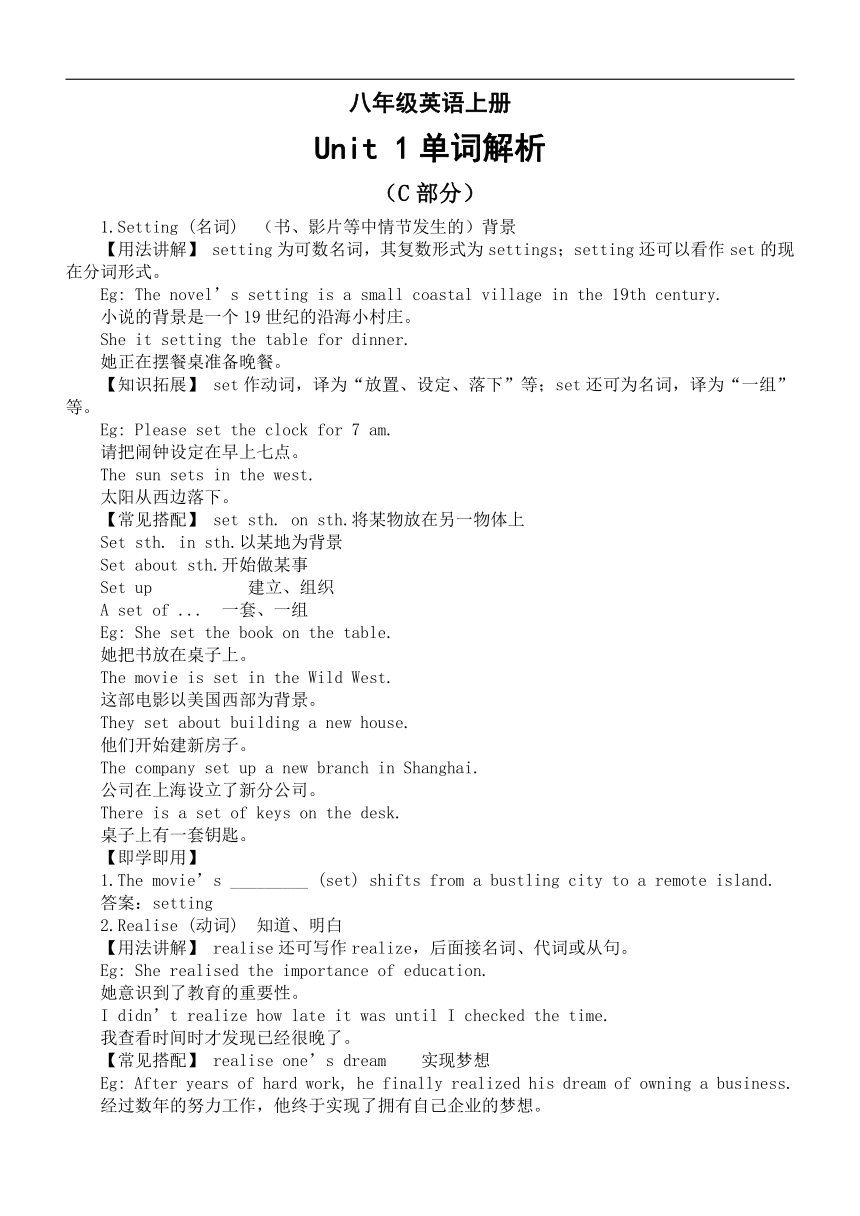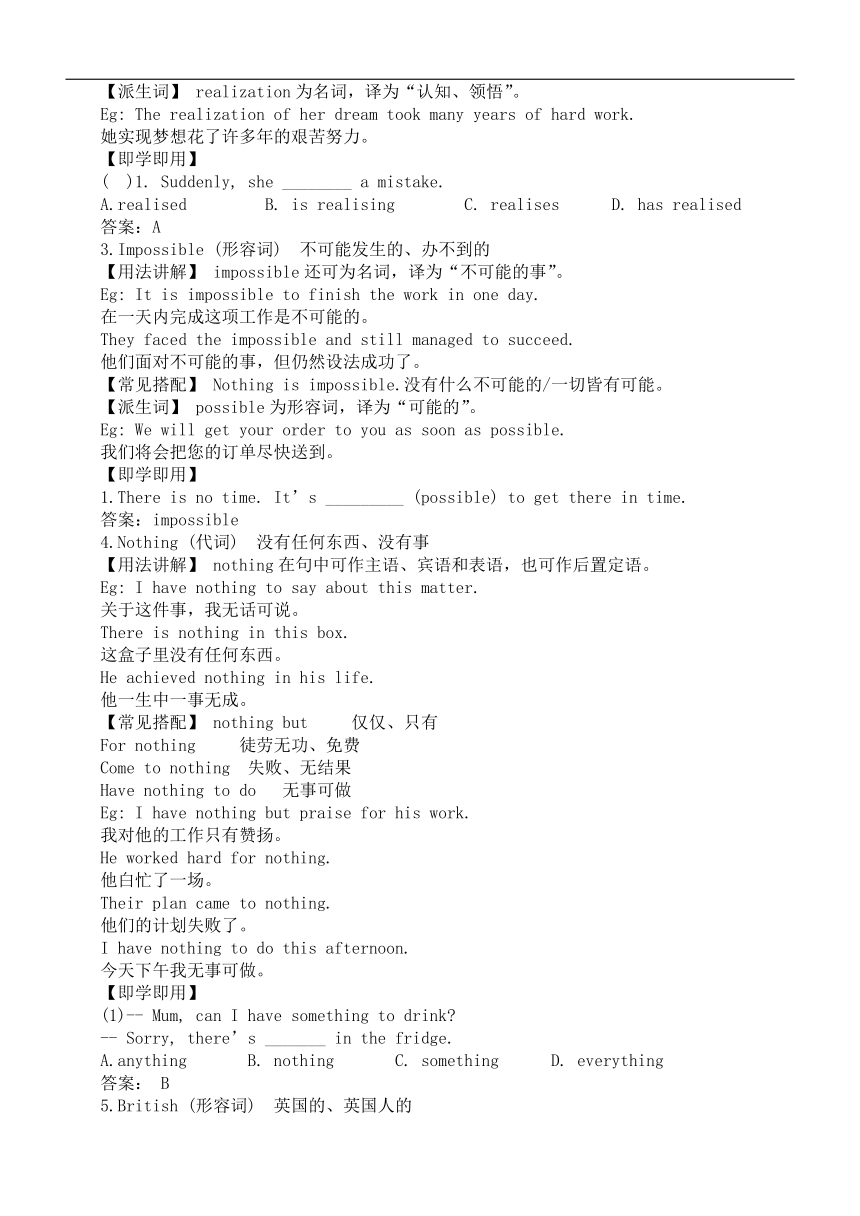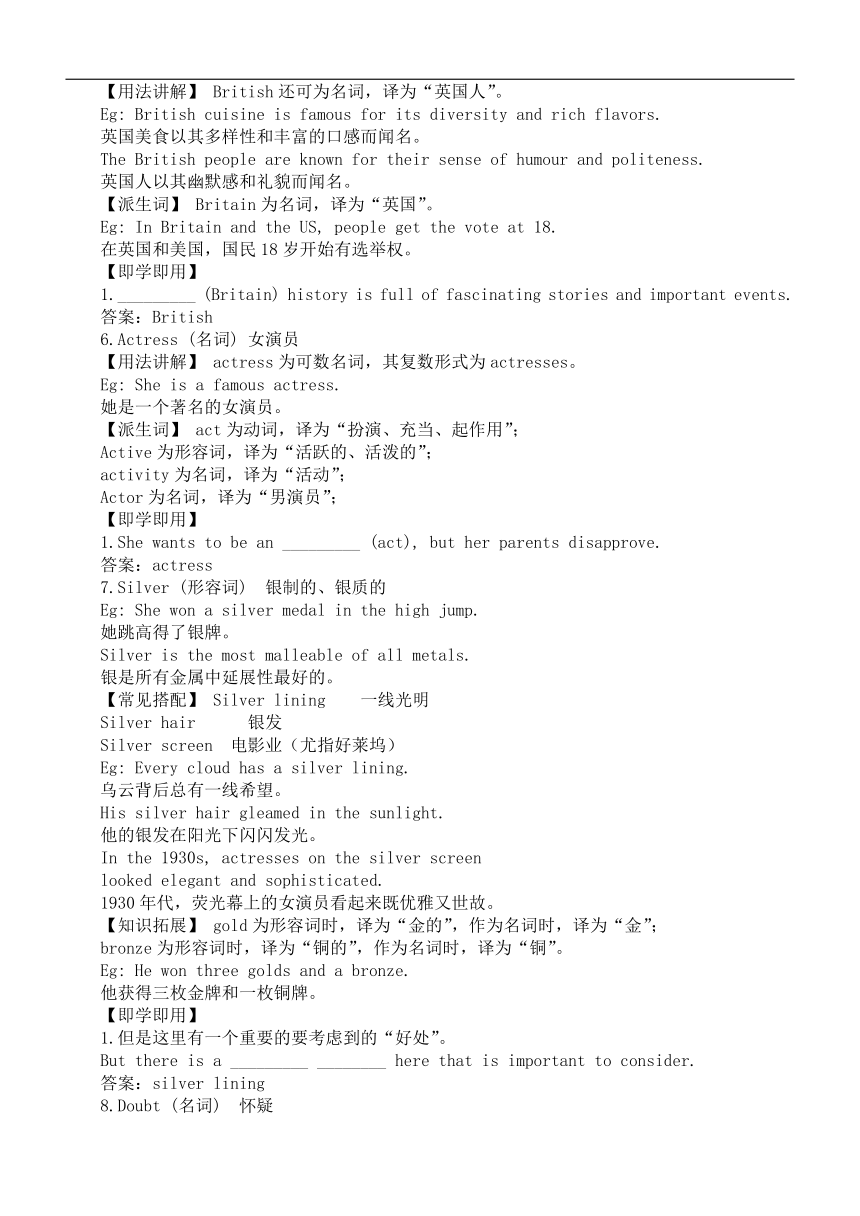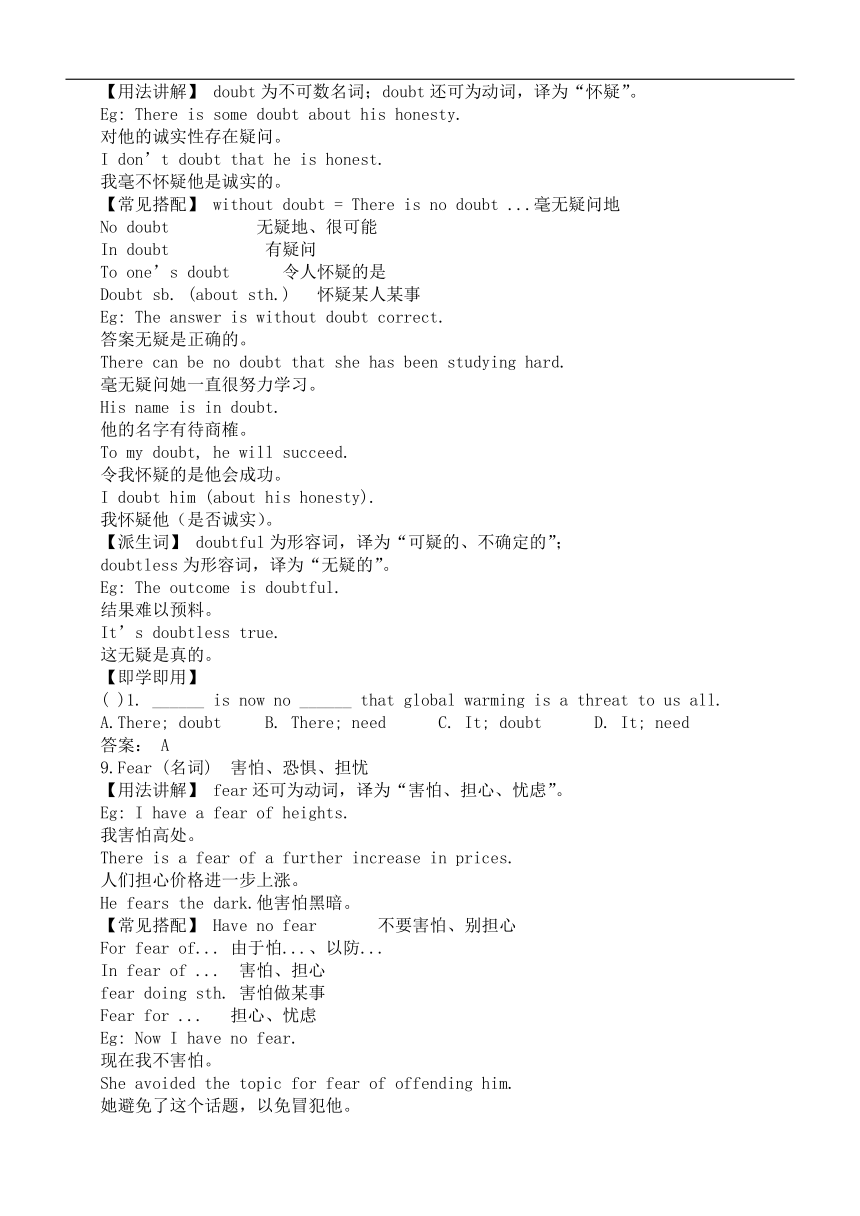Unit1 This+is+me单词解析(C部分)外研版(2024)八年级英语上册
文档属性
| 名称 | Unit1 This+is+me单词解析(C部分)外研版(2024)八年级英语上册 |  | |
| 格式 | docx | ||
| 文件大小 | 36.2KB | ||
| 资源类型 | 教案 | ||
| 版本资源 | 外研版 | ||
| 科目 | 英语 | ||
| 更新时间 | 2025-07-03 16:37:57 | ||
图片预览




文档简介
八年级英语上册
Unit 1单词解析
(C部分)
1.Setting (名词) (书、影片等中情节发生的)背景
【用法讲解】 setting为可数名词,其复数形式为settings;setting还可以看作set的现在分词形式。
Eg: The novel’s setting is a small coastal village in the 19th century.
小说的背景是一个19世纪的沿海小村庄。
She it setting the table for dinner.
她正在摆餐桌准备晚餐。
【知识拓展】 set作动词,译为“放置、设定、落下”等;set还可为名词,译为“一组”等。
Eg: Please set the clock for 7 am.
请把闹钟设定在早上七点。
The sun sets in the west.
太阳从西边落下。
【常见搭配】 set sth. on sth.将某物放在另一物体上
Set sth. in sth.以某地为背景
Set about sth.开始做某事
Set up 建立、组织
A set of ... 一套、一组
Eg: She set the book on the table.
她把书放在桌子上。
The movie is set in the Wild West.
这部电影以美国西部为背景。
They set about building a new house.
他们开始建新房子。
The company set up a new branch in Shanghai.
公司在上海设立了新分公司。
There is a set of keys on the desk.
桌子上有一套钥匙。
【即学即用】
1.The movie’s _________ (set) shifts from a bustling city to a remote island.
答案:setting
2.Realise (动词) 知道、明白
【用法讲解】 realise还可写作realize,后面接名词、代词或从句。
Eg: She realised the importance of education.
她意识到了教育的重要性。
I didn’t realize how late it was until I checked the time.
我查看时间时才发现已经很晚了。
【常见搭配】 realise one’s dream 实现梦想
Eg: After years of hard work, he finally realized his dream of owning a business.
经过数年的努力工作,他终于实现了拥有自己企业的梦想。
【派生词】 realization为名词,译为“认知、领悟”。
Eg: The realization of her dream took many years of hard work.
她实现梦想花了许多年的艰苦努力。
【即学即用】
( )1. Suddenly, she ________ a mistake.
A.realised B. is realising C. realises D. has realised
答案:A
3.Impossible (形容词) 不可能发生的、办不到的
【用法讲解】 impossible还可为名词,译为“不可能的事”。
Eg: It is impossible to finish the work in one day.
在一天内完成这项工作是不可能的。
They faced the impossible and still managed to succeed.
他们面对不可能的事,但仍然设法成功了。
【常见搭配】 Nothing is impossible.没有什么不可能的/一切皆有可能。
【派生词】 possible为形容词,译为“可能的”。
Eg: We will get your order to you as soon as possible.
我们将会把您的订单尽快送到。
【即学即用】
1.There is no time. It’s _________ (possible) to get there in time.
答案:impossible
4.Nothing (代词) 没有任何东西、没有事
【用法讲解】 nothing在句中可作主语、宾语和表语,也可作后置定语。
Eg: I have nothing to say about this matter.
关于这件事,我无话可说。
There is nothing in this box.
这盒子里没有任何东西。
He achieved nothing in his life.
他一生中一事无成。
【常见搭配】 nothing but 仅仅、只有
For nothing 徒劳无功、免费
Come to nothing 失败、无结果
Have nothing to do 无事可做
Eg: I have nothing but praise for his work.
我对他的工作只有赞扬。
He worked hard for nothing.
他白忙了一场。
Their plan came to nothing.
他们的计划失败了。
I have nothing to do this afternoon.
今天下午我无事可做。
【即学即用】
(1)-- Mum, can I have something to drink
-- Sorry, there’s _______ in the fridge.
A.anything B. nothing C. something D. everything
答案: B
5.British (形容词) 英国的、英国人的
【用法讲解】 British还可为名词,译为“英国人”。
Eg: British cuisine is famous for its diversity and rich flavors.
英国美食以其多样性和丰富的口感而闻名。
The British people are known for their sense of humour and politeness.
英国人以其幽默感和礼貌而闻名。
【派生词】 Britain为名词,译为“英国”。
Eg: In Britain and the US, people get the vote at 18.
在英国和美国,国民18岁开始有选举权。
【即学即用】
1._________ (Britain) history is full of fascinating stories and important events.
答案:British
6.Actress (名词) 女演员
【用法讲解】 actress为可数名词,其复数形式为actresses。
Eg: She is a famous actress.
她是一个著名的女演员。
【派生词】 act为动词,译为“扮演、充当、起作用”;
Active为形容词,译为“活跃的、活泼的”;
activity为名词,译为“活动”;
Actor为名词,译为“男演员”;
【即学即用】
1.She wants to be an _________ (act), but her parents disapprove.
答案:actress
7.Silver (形容词) 银制的、银质的
Eg: She won a silver medal in the high jump.
她跳高得了银牌。
Silver is the most malleable of all metals.
银是所有金属中延展性最好的。
【常见搭配】 Silver lining 一线光明
Silver hair 银发
Silver screen 电影业(尤指好莱坞)
Eg: Every cloud has a silver lining.
乌云背后总有一线希望。
His silver hair gleamed in the sunlight.
他的银发在阳光下闪闪发光。
In the 1930s, actresses on the silver screen
looked elegant and sophisticated.
1930年代,荧光幕上的女演员看起来既优雅又世故。
【知识拓展】 gold为形容词时,译为“金的”,作为名词时,译为“金”;
bronze为形容词时,译为“铜的”,作为名词时,译为“铜”。
Eg: He won three golds and a bronze.
他获得三枚金牌和一枚铜牌。
【即学即用】
1.但是这里有一个重要的要考虑到的“好处”。
But there is a _________ ________ here that is important to consider.
答案:silver lining
8.Doubt (名词) 怀疑
【用法讲解】 doubt为不可数名词;doubt还可为动词,译为“怀疑”。
Eg: There is some doubt about his honesty.
对他的诚实性存在疑问。
I don’t doubt that he is honest.
我毫不怀疑他是诚实的。
【常见搭配】 without doubt = There is no doubt ...毫无疑问地
No doubt 无疑地、很可能
In doubt 有疑问
To one’s doubt 令人怀疑的是
Doubt sb. (about sth.) 怀疑某人某事
Eg: The answer is without doubt correct.
答案无疑是正确的。
There can be no doubt that she has been studying hard.
毫无疑问她一直很努力学习。
His name is in doubt.
他的名字有待商榷。
To my doubt, he will succeed.
令我怀疑的是他会成功。
I doubt him (about his honesty).
我怀疑他(是否诚实)。
【派生词】 doubtful为形容词,译为“可疑的、不确定的”;
doubtless为形容词,译为“无疑的”。
Eg: The outcome is doubtful.
结果难以预料。
It’s doubtless true.
这无疑是真的。
【即学即用】
( )1. ______ is now no ______ that global warming is a threat to us all.
A.There; doubt B. There; need C. It; doubt D. It; need
答案: A
9.Fear (名词) 害怕、恐惧、担忧
【用法讲解】 fear还可为动词,译为“害怕、担心、忧虑”。
Eg: I have a fear of heights.
我害怕高处。
There is a fear of a further increase in prices.
人们担心价格进一步上涨。
He fears the dark.他害怕黑暗。
【常见搭配】 Have no fear 不要害怕、别担心
For fear of... 由于怕...、以防...
In fear of ... 害怕、担心
fear doing sth. 害怕做某事
Fear for ... 担心、忧虑
Eg: Now I have no fear.
现在我不害怕。
She avoided the topic for fear of offending him.
她避免了这个话题,以免冒犯他。
They worked in fear of being caught.
他们在害怕被抓的状态下工作。
He fears disappointing others.
他害怕让别人失望。
She felt fear for her son’s safety.
她为儿子的安全担忧。
【派生词】 fearful为形容词,译为“害怕的、担心的”;
fearless为形容词,译为“无畏的”。
Eg: Parents are ever fearful for their children.
父母总是为子女担忧。
Lu Xun is a fearless fighter.
鲁迅是一名无畏的战士。
【即学即用】
1.When you are ________ (fear), you can go a lot faster.
答案:fearless
10.Succeed (动词) 成功、达成
【用法讲解】 succeed作动词还可译为“继任、接替、紧接着”,。
Eg: He succeeded at his new project.
他在新项目上取得成功。
The vice president will succeed the president.
副总统将继任总统。
Night succeeds day.
夜晚紧接着白天而来。
【常见搭配】 succeed in doing sth.成功做某事
Succeed at sth.在某种技能或学科上取得成就
Succeed to sth.继承(地位、财产等)
Succeed with sth. 在某方面获得成功
Eg: We succeeded in repairing the engine.
我们成功地修好了发送机。
He succeeded at playing the piano.
他在弹钢琴上取得了成功。
She succeeded to the throne.
她继承了王位。
He succeeded with his business plan.
他的商业计划获得了成功。
【派生词】 success为不可数名词,译为“成功、胜利、成就”;
successful为形容词,译为“成功的”;
successfully为副词,译为“成功地”。
Eg: Their success is due in large part to their determination.
他们成功在很大程度上应归于他们的决心。
She is a successful actress.
她是一名成功的演员。
They successfully communicate their knowledge to others.
他们成功地把知识传授给他人。
【常见搭配】 the key to success 成功的秘诀
Be successful in doing sth. 成功做某事
Eg: Do you know the key to success
你知道成功的秘诀吗?
They were successful in winning the contract.
他们终于争取了那份合同。
【即学即用】
1.She succeeded in __________ (pass) the exam.
答案:passing
11.Excellent (形容词) 卓越的、极好的
【用法讲解】 excellent在句中常作定语或表语;在口语中可作感叹词单独使用。
Eg: Miss Wang is an excellent teacher.
王老师是一个极好的老师。
The service was excellent.
服务非常出色。
Excellent! Let’s go!
太好了!我们走吧!
【常见搭配】 be excellent at (doing sth.) 擅长于(做某事)...
Eg: She is excellent at painting.她擅长绘画。
【即学即用】
1.他很擅长解决复杂问题。
He _______ ________ _______ solving complex problems.
答案:is excellent at
12.Second (名词) 秒
【用法讲解】 second为可数名词,其复数形式为seconds;second还可为two的序数词,译为“第二”;second还可为动词,译为“支持、赞同”。
Eg: It only takes a few seconds to prepare a cup of coffee.
仅需几秒钟就可以准备一杯咖啡。
The runner finished second place in the marathon.
这位选手在马拉松比赛中获得第二名。
I second your proposal to organize a company - wide event.
我支持你组织一场全公司性的活动的提议。
【常见搭配】 second to none 首屈一指、无人能敌
Eg: When it comes to cooking, my mother is second to none.
在烹饪方面,你妈妈的技艺无与伦比。
【派生词】 secondly为副词,译为“第二点、其次”。
Eg: Firstly, we need to analyze the problem; secondly, we should find solutions.
首先,我们需要分析问题;其次,我们应该寻找解决方案。
【即学即用】
1.The _________ (two) book on the shelf is mine.
答案:second
13.Satisfy (动词) 使(某人)满意
【用法讲解】 satisfy后面接名词或代词作宾语,也可用于被动语态结构,但不用于进行时。
Eg: She cooked a delicious meal to satisfy her guests.
她做了一顿美味的饭菜来让客人满意。
He tried to satisfy me of his sincerity.
他竭力让我相信他的诚意。
【常见搭配】 be satisfied with ... 对...满意
Satisfy oneself 彻底弄清楚
Satisfy one’s needs/ curiosity 满足某人的需求/好奇心
Eg: I am satisfied with the result.
我对结果很满意。
He satisfied himself with his achievements.
他对自己的成就感到很满足。
He read the book to satisfy his curiosity.
他读那本书来满足他的好奇心。
【派生词】 satisfaction为名词,译为“满意”。
Eg: It gave me a feeling of satisfaction.
这给了我一种满足感。
【即学即用】
1.我们将尽力满足你的要求。
We will try our best to _______ _______ _______.
答案:satisfy your needs
14.Risky (形容词) 有危险的、有风险的
【用法讲解】 risky在句中常作定语或表语。
Eg: Skydiving is a risky sport.
高空跳伞是一项高风险运动。
Investing in startups is risky but potentially rewarding.
投资初创公司有风险,但可能有高回报。
【派生词】 risk为名词,译为“风险、危险性”;risk还可为动词,译为“冒险”。
Eg: He is willing to take a risk to start his own business.
他愿意冒险创办自己的公司。
I wouldn’t risk driving in such bad weather.
我不会冒着这么恶劣的天气开车的。
【常见搭配】 at risk 处于危险中
Risk doing sth.冒险做某事
Risk one’s life 冒着生命危险
Eg: Hundreds of thousands of people are at risk.
有几十万人正处于危险中。
She risked losing her job by speaking out against corruption.
她因公开反对腐败而冒着失业的风险。
They risk their lives to save the drowning child.
他们冒着生命危险去救那个溺水的孩子。
【即学即用】
1.Smoking is a ________ (risk) habit that increases the chance of lung cancer.
答案:risky
15.Zero (数词) 零
【用法讲解】 zero还可作可数名词,译为“零点、零度”,其复数形式为zeros;zero还可为动词,译为“将...归零、瞄准、集中注意力”;zero亦可作形容词,译为“全无的、没有的”。
Eg: The temperature could fall below zero overnight.
气温可能降到零度以下。
Zero books were left on the shelf.
书架上没有书了。
He has zero chance of winning the election.
他赢得选举的机会为零。
You need to zero the scales before weighing anything.
在称重之前,你需要将天平归零。
He has a zero tolerance policy for dishonesty.
他对不诚实行动采取零容忍政策。
【常见搭配】 zero in (on) 瞄准、对准、集中于
Eg: The police zeroed in on the suspect’s car.
警察集中注意力于嫌疑人的车。
【即学即用】
1.We won the game with a score of five to ______ (零).
答案:zero
16.Olympics (名词) 奥林匹克运动会、奥运会
【用法讲解】 Olympics是Olympic的复数形式,通常指奥林匹克运动会或多届奥运会。
Eg: The Olympics are held every four years.
奥运会每四年举办一次。
【常见搭配】 winter Olympics 冬季奥运会
Summer Olympics 夏季奥运会
Eg: The city will host the next winter Olympics.
这个城市将举办下一届冬奥会。
【即学即用】
1.She won a gold medal in the O_________.
答案:Olympics
17.Athlete (名词) 运动员、田径运动员
【用法讲解】 athlete为可数名词,其复数形式为athletes。
Eg: He became a professional athlete at the age of 19.
他19岁成为职业运动员。
【即学即用】
1.She is one of the most talented _________ (athlete) in the team.
答案:athletes
18.Youngster (名词) 年轻人
【用法讲解】 youngster为可数名词,其复数形式为youngsters。
Eg: The park is full of youngsters playing football on weekends.
周末公园里满是踢足球的年轻人。
【易混辨析】 teenager、youth与adolescent区别:
teenager特指13-19岁的青少年,年龄范围明确;
youth泛指青年群体,更抽象或集体化;
adolescent泛指青春期人群,无明确年龄界限。
Eg: Despite his age, he is still a youngster at heart and loves skateboarding.
尽管他年纪不小了,但心态依然年轻,热爱滑板运动。
They were fine specimens of British youth!
他们堪称英国青年的优秀代表。
Most adolescent problems are temporary.
多数青少年问题是暂时性的。
【即学即用】
1.More than six million y__________ tune in to the show every day.
答案:youngsters
19.Stick (动词) 粘、贴
【用法讲解】 stick可作动词,译为“粘贴、卡住”;stick也为可数名词,其复数形式为sticks,还可译为“棍、棒”。
Eg: The glue stuck the paper to the wall.
胶水把纸粘在了墙上。
The coin stuck in the slot.
硬币卡在了插槽里。
The tree has many sticks.
这棵树有很多枝条。
Did you see my walking stick
你看见我的拐棍了吗?
【常见搭配】 stick out 伸出
Stick to 坚持、信守
Stick with 继续做
Eg: He stuck out his hand to shake hands with me.
他伸出手和我握手。
He stuck to his decision despite the opposition.
尽管遭到反对,他还是坚持自己的决定。
He stuck with his studies even when he was tired.
即使累了,他还是坚持学习。
【即学即用】
1.坚持你的原则,就会胜利。
_______ ______ your principles, and you will win through.
答案: Stick to
20.Superman (名词) 超人
【用法讲解】 superman为可数名词,其复数形式为supermen。
Eg: Lucy drew a picture of Superman.
露西画了一幅超人的画。
【即学即用】
1.The young men look like _________ (superman).
答案:supermen
Unit 1单词解析
(C部分)
1.Setting (名词) (书、影片等中情节发生的)背景
【用法讲解】 setting为可数名词,其复数形式为settings;setting还可以看作set的现在分词形式。
Eg: The novel’s setting is a small coastal village in the 19th century.
小说的背景是一个19世纪的沿海小村庄。
She it setting the table for dinner.
她正在摆餐桌准备晚餐。
【知识拓展】 set作动词,译为“放置、设定、落下”等;set还可为名词,译为“一组”等。
Eg: Please set the clock for 7 am.
请把闹钟设定在早上七点。
The sun sets in the west.
太阳从西边落下。
【常见搭配】 set sth. on sth.将某物放在另一物体上
Set sth. in sth.以某地为背景
Set about sth.开始做某事
Set up 建立、组织
A set of ... 一套、一组
Eg: She set the book on the table.
她把书放在桌子上。
The movie is set in the Wild West.
这部电影以美国西部为背景。
They set about building a new house.
他们开始建新房子。
The company set up a new branch in Shanghai.
公司在上海设立了新分公司。
There is a set of keys on the desk.
桌子上有一套钥匙。
【即学即用】
1.The movie’s _________ (set) shifts from a bustling city to a remote island.
答案:setting
2.Realise (动词) 知道、明白
【用法讲解】 realise还可写作realize,后面接名词、代词或从句。
Eg: She realised the importance of education.
她意识到了教育的重要性。
I didn’t realize how late it was until I checked the time.
我查看时间时才发现已经很晚了。
【常见搭配】 realise one’s dream 实现梦想
Eg: After years of hard work, he finally realized his dream of owning a business.
经过数年的努力工作,他终于实现了拥有自己企业的梦想。
【派生词】 realization为名词,译为“认知、领悟”。
Eg: The realization of her dream took many years of hard work.
她实现梦想花了许多年的艰苦努力。
【即学即用】
( )1. Suddenly, she ________ a mistake.
A.realised B. is realising C. realises D. has realised
答案:A
3.Impossible (形容词) 不可能发生的、办不到的
【用法讲解】 impossible还可为名词,译为“不可能的事”。
Eg: It is impossible to finish the work in one day.
在一天内完成这项工作是不可能的。
They faced the impossible and still managed to succeed.
他们面对不可能的事,但仍然设法成功了。
【常见搭配】 Nothing is impossible.没有什么不可能的/一切皆有可能。
【派生词】 possible为形容词,译为“可能的”。
Eg: We will get your order to you as soon as possible.
我们将会把您的订单尽快送到。
【即学即用】
1.There is no time. It’s _________ (possible) to get there in time.
答案:impossible
4.Nothing (代词) 没有任何东西、没有事
【用法讲解】 nothing在句中可作主语、宾语和表语,也可作后置定语。
Eg: I have nothing to say about this matter.
关于这件事,我无话可说。
There is nothing in this box.
这盒子里没有任何东西。
He achieved nothing in his life.
他一生中一事无成。
【常见搭配】 nothing but 仅仅、只有
For nothing 徒劳无功、免费
Come to nothing 失败、无结果
Have nothing to do 无事可做
Eg: I have nothing but praise for his work.
我对他的工作只有赞扬。
He worked hard for nothing.
他白忙了一场。
Their plan came to nothing.
他们的计划失败了。
I have nothing to do this afternoon.
今天下午我无事可做。
【即学即用】
(1)-- Mum, can I have something to drink
-- Sorry, there’s _______ in the fridge.
A.anything B. nothing C. something D. everything
答案: B
5.British (形容词) 英国的、英国人的
【用法讲解】 British还可为名词,译为“英国人”。
Eg: British cuisine is famous for its diversity and rich flavors.
英国美食以其多样性和丰富的口感而闻名。
The British people are known for their sense of humour and politeness.
英国人以其幽默感和礼貌而闻名。
【派生词】 Britain为名词,译为“英国”。
Eg: In Britain and the US, people get the vote at 18.
在英国和美国,国民18岁开始有选举权。
【即学即用】
1._________ (Britain) history is full of fascinating stories and important events.
答案:British
6.Actress (名词) 女演员
【用法讲解】 actress为可数名词,其复数形式为actresses。
Eg: She is a famous actress.
她是一个著名的女演员。
【派生词】 act为动词,译为“扮演、充当、起作用”;
Active为形容词,译为“活跃的、活泼的”;
activity为名词,译为“活动”;
Actor为名词,译为“男演员”;
【即学即用】
1.She wants to be an _________ (act), but her parents disapprove.
答案:actress
7.Silver (形容词) 银制的、银质的
Eg: She won a silver medal in the high jump.
她跳高得了银牌。
Silver is the most malleable of all metals.
银是所有金属中延展性最好的。
【常见搭配】 Silver lining 一线光明
Silver hair 银发
Silver screen 电影业(尤指好莱坞)
Eg: Every cloud has a silver lining.
乌云背后总有一线希望。
His silver hair gleamed in the sunlight.
他的银发在阳光下闪闪发光。
In the 1930s, actresses on the silver screen
looked elegant and sophisticated.
1930年代,荧光幕上的女演员看起来既优雅又世故。
【知识拓展】 gold为形容词时,译为“金的”,作为名词时,译为“金”;
bronze为形容词时,译为“铜的”,作为名词时,译为“铜”。
Eg: He won three golds and a bronze.
他获得三枚金牌和一枚铜牌。
【即学即用】
1.但是这里有一个重要的要考虑到的“好处”。
But there is a _________ ________ here that is important to consider.
答案:silver lining
8.Doubt (名词) 怀疑
【用法讲解】 doubt为不可数名词;doubt还可为动词,译为“怀疑”。
Eg: There is some doubt about his honesty.
对他的诚实性存在疑问。
I don’t doubt that he is honest.
我毫不怀疑他是诚实的。
【常见搭配】 without doubt = There is no doubt ...毫无疑问地
No doubt 无疑地、很可能
In doubt 有疑问
To one’s doubt 令人怀疑的是
Doubt sb. (about sth.) 怀疑某人某事
Eg: The answer is without doubt correct.
答案无疑是正确的。
There can be no doubt that she has been studying hard.
毫无疑问她一直很努力学习。
His name is in doubt.
他的名字有待商榷。
To my doubt, he will succeed.
令我怀疑的是他会成功。
I doubt him (about his honesty).
我怀疑他(是否诚实)。
【派生词】 doubtful为形容词,译为“可疑的、不确定的”;
doubtless为形容词,译为“无疑的”。
Eg: The outcome is doubtful.
结果难以预料。
It’s doubtless true.
这无疑是真的。
【即学即用】
( )1. ______ is now no ______ that global warming is a threat to us all.
A.There; doubt B. There; need C. It; doubt D. It; need
答案: A
9.Fear (名词) 害怕、恐惧、担忧
【用法讲解】 fear还可为动词,译为“害怕、担心、忧虑”。
Eg: I have a fear of heights.
我害怕高处。
There is a fear of a further increase in prices.
人们担心价格进一步上涨。
He fears the dark.他害怕黑暗。
【常见搭配】 Have no fear 不要害怕、别担心
For fear of... 由于怕...、以防...
In fear of ... 害怕、担心
fear doing sth. 害怕做某事
Fear for ... 担心、忧虑
Eg: Now I have no fear.
现在我不害怕。
She avoided the topic for fear of offending him.
她避免了这个话题,以免冒犯他。
They worked in fear of being caught.
他们在害怕被抓的状态下工作。
He fears disappointing others.
他害怕让别人失望。
She felt fear for her son’s safety.
她为儿子的安全担忧。
【派生词】 fearful为形容词,译为“害怕的、担心的”;
fearless为形容词,译为“无畏的”。
Eg: Parents are ever fearful for their children.
父母总是为子女担忧。
Lu Xun is a fearless fighter.
鲁迅是一名无畏的战士。
【即学即用】
1.When you are ________ (fear), you can go a lot faster.
答案:fearless
10.Succeed (动词) 成功、达成
【用法讲解】 succeed作动词还可译为“继任、接替、紧接着”,。
Eg: He succeeded at his new project.
他在新项目上取得成功。
The vice president will succeed the president.
副总统将继任总统。
Night succeeds day.
夜晚紧接着白天而来。
【常见搭配】 succeed in doing sth.成功做某事
Succeed at sth.在某种技能或学科上取得成就
Succeed to sth.继承(地位、财产等)
Succeed with sth. 在某方面获得成功
Eg: We succeeded in repairing the engine.
我们成功地修好了发送机。
He succeeded at playing the piano.
他在弹钢琴上取得了成功。
She succeeded to the throne.
她继承了王位。
He succeeded with his business plan.
他的商业计划获得了成功。
【派生词】 success为不可数名词,译为“成功、胜利、成就”;
successful为形容词,译为“成功的”;
successfully为副词,译为“成功地”。
Eg: Their success is due in large part to their determination.
他们成功在很大程度上应归于他们的决心。
She is a successful actress.
她是一名成功的演员。
They successfully communicate their knowledge to others.
他们成功地把知识传授给他人。
【常见搭配】 the key to success 成功的秘诀
Be successful in doing sth. 成功做某事
Eg: Do you know the key to success
你知道成功的秘诀吗?
They were successful in winning the contract.
他们终于争取了那份合同。
【即学即用】
1.She succeeded in __________ (pass) the exam.
答案:passing
11.Excellent (形容词) 卓越的、极好的
【用法讲解】 excellent在句中常作定语或表语;在口语中可作感叹词单独使用。
Eg: Miss Wang is an excellent teacher.
王老师是一个极好的老师。
The service was excellent.
服务非常出色。
Excellent! Let’s go!
太好了!我们走吧!
【常见搭配】 be excellent at (doing sth.) 擅长于(做某事)...
Eg: She is excellent at painting.她擅长绘画。
【即学即用】
1.他很擅长解决复杂问题。
He _______ ________ _______ solving complex problems.
答案:is excellent at
12.Second (名词) 秒
【用法讲解】 second为可数名词,其复数形式为seconds;second还可为two的序数词,译为“第二”;second还可为动词,译为“支持、赞同”。
Eg: It only takes a few seconds to prepare a cup of coffee.
仅需几秒钟就可以准备一杯咖啡。
The runner finished second place in the marathon.
这位选手在马拉松比赛中获得第二名。
I second your proposal to organize a company - wide event.
我支持你组织一场全公司性的活动的提议。
【常见搭配】 second to none 首屈一指、无人能敌
Eg: When it comes to cooking, my mother is second to none.
在烹饪方面,你妈妈的技艺无与伦比。
【派生词】 secondly为副词,译为“第二点、其次”。
Eg: Firstly, we need to analyze the problem; secondly, we should find solutions.
首先,我们需要分析问题;其次,我们应该寻找解决方案。
【即学即用】
1.The _________ (two) book on the shelf is mine.
答案:second
13.Satisfy (动词) 使(某人)满意
【用法讲解】 satisfy后面接名词或代词作宾语,也可用于被动语态结构,但不用于进行时。
Eg: She cooked a delicious meal to satisfy her guests.
她做了一顿美味的饭菜来让客人满意。
He tried to satisfy me of his sincerity.
他竭力让我相信他的诚意。
【常见搭配】 be satisfied with ... 对...满意
Satisfy oneself 彻底弄清楚
Satisfy one’s needs/ curiosity 满足某人的需求/好奇心
Eg: I am satisfied with the result.
我对结果很满意。
He satisfied himself with his achievements.
他对自己的成就感到很满足。
He read the book to satisfy his curiosity.
他读那本书来满足他的好奇心。
【派生词】 satisfaction为名词,译为“满意”。
Eg: It gave me a feeling of satisfaction.
这给了我一种满足感。
【即学即用】
1.我们将尽力满足你的要求。
We will try our best to _______ _______ _______.
答案:satisfy your needs
14.Risky (形容词) 有危险的、有风险的
【用法讲解】 risky在句中常作定语或表语。
Eg: Skydiving is a risky sport.
高空跳伞是一项高风险运动。
Investing in startups is risky but potentially rewarding.
投资初创公司有风险,但可能有高回报。
【派生词】 risk为名词,译为“风险、危险性”;risk还可为动词,译为“冒险”。
Eg: He is willing to take a risk to start his own business.
他愿意冒险创办自己的公司。
I wouldn’t risk driving in such bad weather.
我不会冒着这么恶劣的天气开车的。
【常见搭配】 at risk 处于危险中
Risk doing sth.冒险做某事
Risk one’s life 冒着生命危险
Eg: Hundreds of thousands of people are at risk.
有几十万人正处于危险中。
She risked losing her job by speaking out against corruption.
她因公开反对腐败而冒着失业的风险。
They risk their lives to save the drowning child.
他们冒着生命危险去救那个溺水的孩子。
【即学即用】
1.Smoking is a ________ (risk) habit that increases the chance of lung cancer.
答案:risky
15.Zero (数词) 零
【用法讲解】 zero还可作可数名词,译为“零点、零度”,其复数形式为zeros;zero还可为动词,译为“将...归零、瞄准、集中注意力”;zero亦可作形容词,译为“全无的、没有的”。
Eg: The temperature could fall below zero overnight.
气温可能降到零度以下。
Zero books were left on the shelf.
书架上没有书了。
He has zero chance of winning the election.
他赢得选举的机会为零。
You need to zero the scales before weighing anything.
在称重之前,你需要将天平归零。
He has a zero tolerance policy for dishonesty.
他对不诚实行动采取零容忍政策。
【常见搭配】 zero in (on) 瞄准、对准、集中于
Eg: The police zeroed in on the suspect’s car.
警察集中注意力于嫌疑人的车。
【即学即用】
1.We won the game with a score of five to ______ (零).
答案:zero
16.Olympics (名词) 奥林匹克运动会、奥运会
【用法讲解】 Olympics是Olympic的复数形式,通常指奥林匹克运动会或多届奥运会。
Eg: The Olympics are held every four years.
奥运会每四年举办一次。
【常见搭配】 winter Olympics 冬季奥运会
Summer Olympics 夏季奥运会
Eg: The city will host the next winter Olympics.
这个城市将举办下一届冬奥会。
【即学即用】
1.She won a gold medal in the O_________.
答案:Olympics
17.Athlete (名词) 运动员、田径运动员
【用法讲解】 athlete为可数名词,其复数形式为athletes。
Eg: He became a professional athlete at the age of 19.
他19岁成为职业运动员。
【即学即用】
1.She is one of the most talented _________ (athlete) in the team.
答案:athletes
18.Youngster (名词) 年轻人
【用法讲解】 youngster为可数名词,其复数形式为youngsters。
Eg: The park is full of youngsters playing football on weekends.
周末公园里满是踢足球的年轻人。
【易混辨析】 teenager、youth与adolescent区别:
teenager特指13-19岁的青少年,年龄范围明确;
youth泛指青年群体,更抽象或集体化;
adolescent泛指青春期人群,无明确年龄界限。
Eg: Despite his age, he is still a youngster at heart and loves skateboarding.
尽管他年纪不小了,但心态依然年轻,热爱滑板运动。
They were fine specimens of British youth!
他们堪称英国青年的优秀代表。
Most adolescent problems are temporary.
多数青少年问题是暂时性的。
【即学即用】
1.More than six million y__________ tune in to the show every day.
答案:youngsters
19.Stick (动词) 粘、贴
【用法讲解】 stick可作动词,译为“粘贴、卡住”;stick也为可数名词,其复数形式为sticks,还可译为“棍、棒”。
Eg: The glue stuck the paper to the wall.
胶水把纸粘在了墙上。
The coin stuck in the slot.
硬币卡在了插槽里。
The tree has many sticks.
这棵树有很多枝条。
Did you see my walking stick
你看见我的拐棍了吗?
【常见搭配】 stick out 伸出
Stick to 坚持、信守
Stick with 继续做
Eg: He stuck out his hand to shake hands with me.
他伸出手和我握手。
He stuck to his decision despite the opposition.
尽管遭到反对,他还是坚持自己的决定。
He stuck with his studies even when he was tired.
即使累了,他还是坚持学习。
【即学即用】
1.坚持你的原则,就会胜利。
_______ ______ your principles, and you will win through.
答案: Stick to
20.Superman (名词) 超人
【用法讲解】 superman为可数名词,其复数形式为supermen。
Eg: Lucy drew a picture of Superman.
露西画了一幅超人的画。
【即学即用】
1.The young men look like _________ (superman).
答案:supermen
同课章节目录
